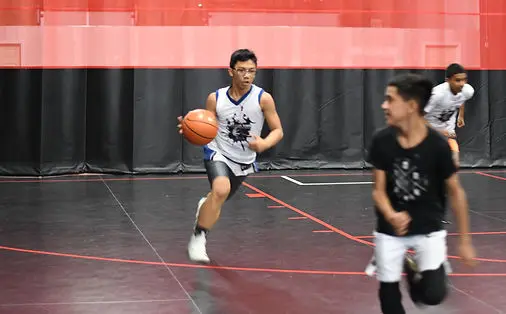Key Takeaways
- Effective skill development focuses on fundamentals like dribbling, shooting, and passing.
- Encouraging teamwork enhances both individual growth and team dynamics.
- Incorporating agility drills boosts on-court performance.
- Analyzing professional gameplay helps young players understand advanced strategies.
- Having a positive mindset fosters resilience and continuous improvement.
Why Fundamentals Matter
Basketball is a dynamic sport that emphasizes more than just scoring points. It is a game of flair, strategy, and skillful execution. For young athletes, the journey begins by mastering the fundamentals—essential building blocks that shape their growth. By focusing on group basketball training, players are integrated into a collaborative setting, allowing them to experience team dynamics while improving personal skills. This communal approach enhances their abilities and instills a sense of camaraderie crucial for team sports.
Early exposure to these basic skills ensures players develop a comprehensive understanding of the game, preparing them for more advanced training. By laying a solid foundation, players can better adapt to complex game scenarios. As players grow, these fundamentals become second nature, enabling them to focus on strategic development and nuanced performance improvements.
The Art of Dribbling
Dribbling is an indispensable skill that empowers players to maintain control and create offensive opportunities. It requires coordination, rhythm, and awareness to maneuver past defenders effectively. Young athletes benefit from engaging in various drills that focus on improving ball-handling skills. Crossover moves, behind-the-back dribbles and hesitation techniques are just a few of the skills that can outwit opponents, providing players the confidence to face any defensive challenge.
Introducing variation in practice routines prevents monotony and keeps players motivated. It develops a player’s adaptability, a critical trait in responding to real-game situations. Observing different playstyles from the NCAA tournaments can be particularly inspiring, allowing young athletes to learn and incorporate new dribbling strategies into their repertoire.
Perfecting Shooting Techniques
Shooting is the linchpin of basketball, where precision meets timing. Young athletes must focus on developing their shooting technique early on—good form results from correct foot placement, hand alignment, and smooth follow-through. Regular practice of set shots, jump shots, and free throws is essential, emphasizing maintaining consistency in form to develop muscle memory. Over time, this practice translates to increased shooting accuracy and confidence in high-pressure situations.
Understanding the subtle dynamics of shooting angles and shot selection enhances a player’s scoring ability. These insights help them adapt their shooting style to different play situations, maximizing scoring opportunities against varied defenses.
Enhancing Passing Skills
Effective passing is both an art and a science. It’s about timing, precision, and anticipation. Teaching athletes how to execute chest, bounce, and overhead passes equips them with tools for optimal ball distribution. Regularity in practice develops accuracy and reinforces trust among teammates, which is fundamental to orchestrating successful plays.
As players refine their passing skills, they learn to read the court better and predict player movements, which is crucial for fast breaks and set plays. This proficiency in passing accelerates gameplay, ensuring the team remains dynamic and unpredictable to opponents.
The Power of Teamwork
Basketball is inherently a team sport, and understanding the dynamics within a team is paramount. Young athletes must learn to cooperate, communicate, and leverage collective strengths to achieve common goals. Each player needs to comprehend their role within the team, adjusting their play to complement others. This adaptability is crucial for maximizing efficiency and effectiveness on the court.
Fostering a cooperative spirit enhances trust and cohesiveness. Engaging in team-building activities can reinforce these principles. These exercises build camaraderie and teach valuable life lessons on collaboration and collective problem-solving, contributing to a winning mentality on and off the court.
Importance of Agility
Agility is the invisible force behind a player’s swift and nimble movements. It encompasses the quickness of footwork and the ability to change direction effortlessly. Agility drills, which often utilize ladders and cones, enhance players’ reflexes, balance, and coordination. These drills are instrumental in preparing athletes to handle the rigors of game-time pressure by improving their reactions to on-court situations.
Crafting agility routines that simulate real-game conundrums encourages players to think critically and act decisively. This adaptability ensures players remain competitive and effective, even against the fastest opponents.
Learning Through Gameplay Analysis
One of the most valuable learning tools for young basketball players is analyzing professional gameplay. Watching games gives athletes insights into various strategic approaches, skill applications, and decision-making processes. It helps them understand what move to make and why it should be made, instilling a deeper cognitive understanding of the sport.
By dissecting professional games, players see how experienced athletes handle pressure, create space, and exploit defenses. This form of learning hones their strategic thinking and helps develop a mature game sense, which is crucial for navigating the complexities of competitive basketball.
Cultivating a Positive Mindset
A positive mindset is a pivotal component of sports achievement. It equips young athletes with the resilience needed to overcome challenges and setbacks. Encouraging players to maintain a positive perspective fosters an environment conducive to learning and growth. This gives them the mental strength required to embrace challenges head-on, recover from failures, and persist in adversity.
Beyond basketball, this mindset supports personal development, guiding athletes to face various challenges with determination and optimism. The continuous development of mental toughness prepares young athletes for sports and life’s broader spectrum of challenges.



